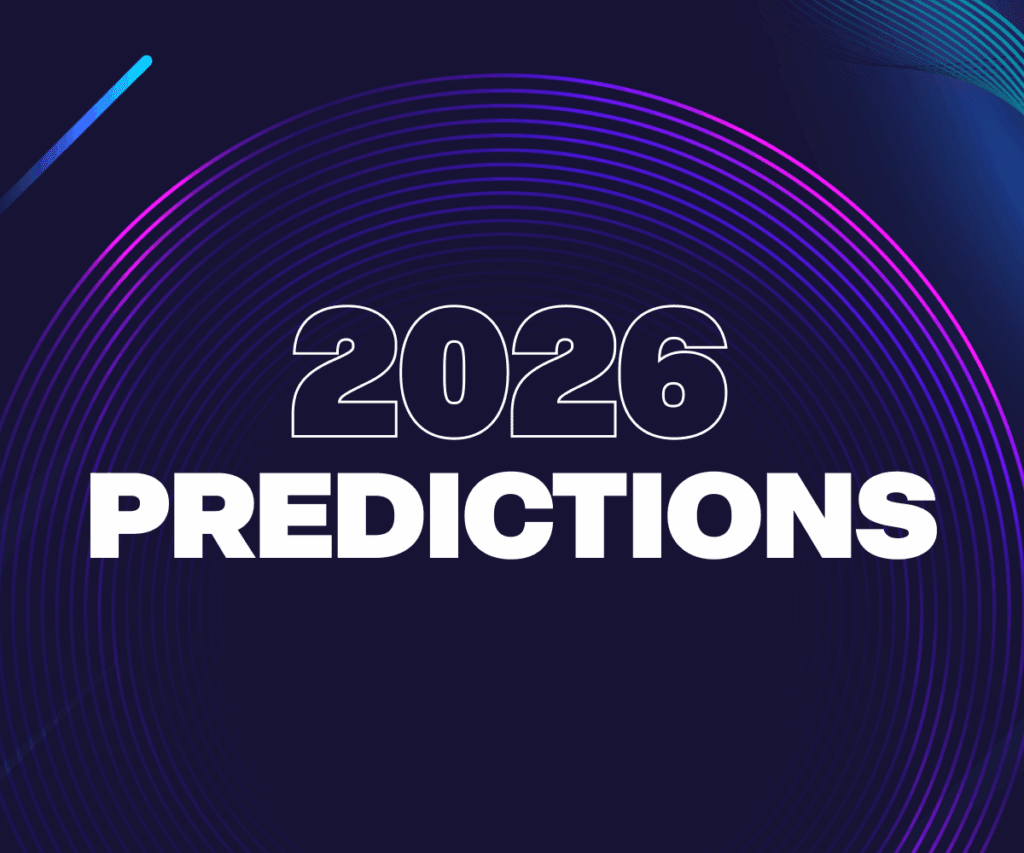17 prospect research tools to boost your donor acquisition strategy

What is a prospect research tool?
Prospect research is an essential part of the fundraising process, but manually keeping track of donor information and prioritizing prospects can get complicated. That’s why nonprofits leverage prospect research tools to streamline the process.
These tools not only help you find new opportunities but also facilitate a deeper understanding of potential donors’ interests, giving histories, and connections. This enables nonprofits to cultivate more meaningful relationships and tailor their appeals more efficiently.
Let’s look at the top prospect research tools to consider, including their features and pricing.
Top prospect research tools for nonprofits
For nonprofits aiming to amplify their fundraising efforts, identifying and engaging potential donors is crucial. Here are the top donor management software tools that help streamline prospect research.
| Platform | Best for | Standout feature |
| Bonterra EveryAction | Mid- to enterprise sized nonprofits | Complete CRM with marketing features and AI-powered fundraising |
| Bonterra Network for Good | Small nonprofits | Fundraising coaching and simple prospect prioritization |
| AlumniFinder | Educational institutions | Helps locate alumni contact info and professional details |
| Candid | Getting noticed by funders | Comprehensive data on nonprofits and funders |
| Dataro | Leveraging data science | AI-powered predictive modeling for donor behavior |
| DonorSearch | Identifying giving history | In-depth philanthropic and wealth data |
| FreeWill | Growing planned giving initiatives | Easy-to-use platform to promote legacy giving |
| Fundraising Report Card | Evaluating fundraising efforts | Automated performance insights and KPI tracking |
| GivingDNA | Determining donor motivations | Behavioral donor profiling for tailored communication |
| iWave | In-depth prospect research | Comprehensive wealth and philanthropic data |
| Instrumentl | Grant fundraising efficiency | Comprehensive grant database with matching and tracking tools |
| Leadership Connect | Up-to-date contact information | Detailed contact data and organizational charts |
| LexisNexis | Compliance and data analysis | Extensive access to legal, regulatory, and financial information |
| Building supporter connections | Professional networking and relationship-building tools | |
| Million Dollar List | Large-scale philanthropic giving | Tracks major philanthropic gifts of $1M+ |
| National Center for Charitable Statistics | Free data on corporate finances | Access to nonprofit financial data (IRS Form 990) |
| Prospect Visual | Visual data analysis | Data visualizations of donor networks, wealth indicators, and giving patterns |
| Security and Exchange Commission (SEC) | Researchers seeking donor financial data | Access to public company filings, stock data, and executive financial information |
1. Bonterra EveryAction
Best for: Mid- to enterprise sized nonprofits looking for a complete CRM with marketing features and AI-powered fundraising
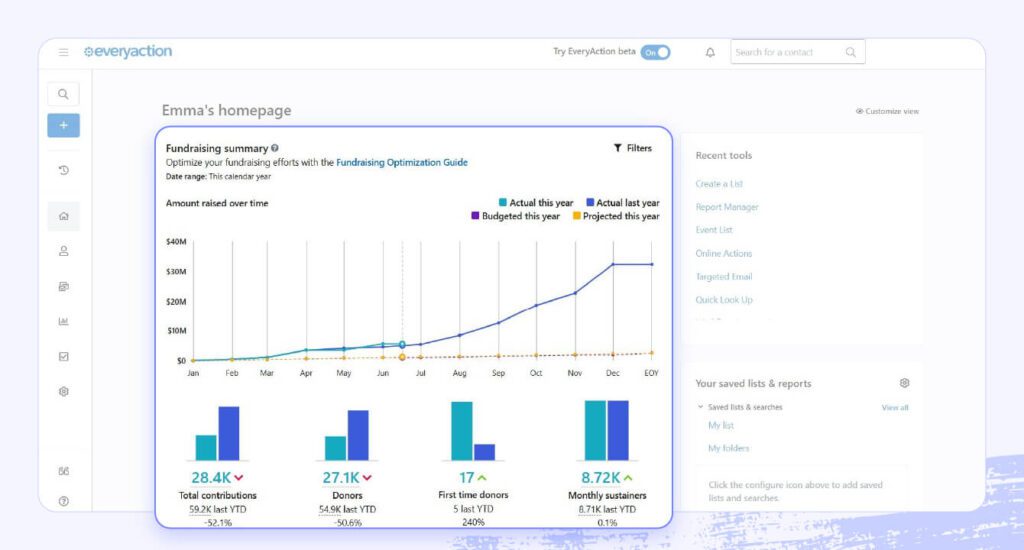
Bonterra EveryAction gives you tools for intelligent prospect research: built-in donor profiles, wealth and philanthropic screening, insights on past giving, and audience segmentation. That means you can not only find potential major donors but immediately see which ones are most likely to respond to each campaign and tailor your outreach accordingly.
Bonterra EveryAction helps you turn prospect research into action. Once you’ve identified high-value donors, you can quickly launch targeted campaigns, track their responses across channels, and refine your outreach using predictive analytics. This closed loop between research and execution makes it a powerful solution for nonprofits serious about expanding their donor pipeline.
Features
- Comprehensive donor profiles: Access detailed giving histories and wealth indicators to evaluate donor capacity.
- Predictive analytics: Forecast which supporters are most likely to give or upgrade their gifts with data-driven insights.
- Segmentation tools: Group donors by affinity, behavior, or demographics to effectively tailor communications.
- Cross-channel tracking: Monitor engagement across email, social media, events, and direct mail to uncover new opportunities.
Price: Custom pricing
Ratings
| Donor management | 4.2 |
| Campaign management | 4.4 |
| Communication management | 4.1 |
| Overall | 4.4 |
Reviews
“Overall, my experience with Bonterra Development + Digital’s tool EveryAction has been overwhelmingly positive.
I’ve been using EveryAction for 9 years while at various nonprofit organizations. I really like how easy to use the tools are, including mobile messaging, online actions, and targeted email. It’s been great for our digital organizing program.” — Rachel D.
“EveryAction is a one-stop shop for managing your development operation across individual donors, online giving, email solicitation, and grants management.
Setup and learning the powerful tools can be overwhelming at first, but with time spent using the application and in EveryAction’s library of help articles and recorded videos, you can quickly become an expert user.” — Aaron W.

2. Bonterra Network for Good
Best for: Small nonprofits getting started with prospect research and donor management
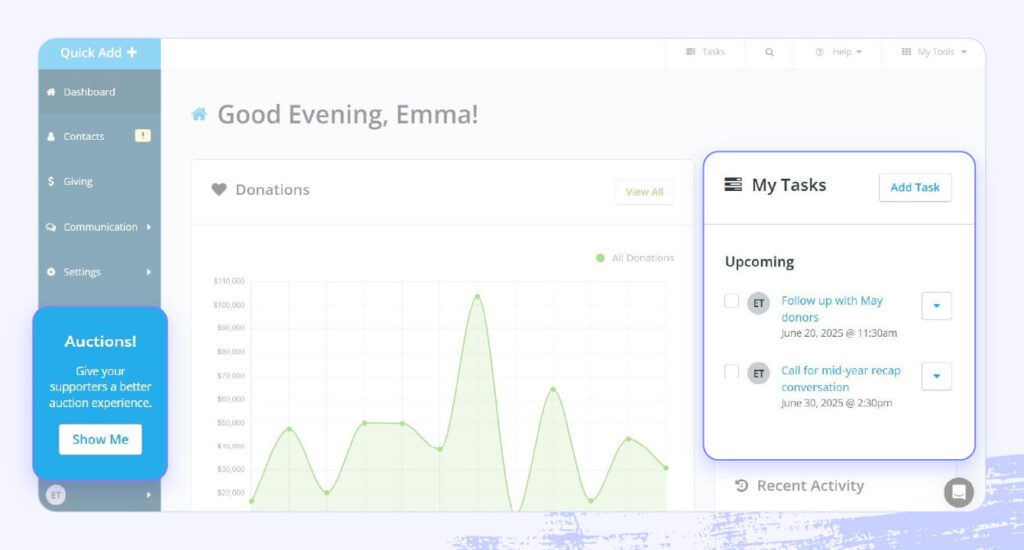
Bonterra Network for Good simplifies the process of identifying potential donors by keeping records organized and accessible. With clear donor activity tracking and personalized coaching, it helps nonprofits recognize patterns in giving behavior and confidently move prospects into more engaged donor relationships without needing a dedicated research team.
If you’re newer to prospect research or your team is smaller, Network for Good offers a friendly entry point. It provides donor history tracking, simpler prospect prioritization, and fundraising coaching, allowing you to make fewer wild guesses about who will give.
Features
- Donor history tracking: Automatically identify patterns in past giving to spot potential for future contributions.
- Simple prospect prioritization: Rank and organize donor lists to focus on the most promising supporters.
- Fundraising coaching: Get expert advice on how to approach new prospects and strategically target your fundraising requests.
- Event and campaign integration: Connect donor data with fundraising activities to identify who is most engaged.
Price: Custom pricing
Ratings
| Donor management | 4.7 |
| Donation tracking | 4.8 |
| Recurring giving | 4.7 |
| Overall | 4.6 |
Reviews
“We set appointments [and] had [a] really friendly and non-judgmental space where we could brainstorm and learn new skills. We were able to be ‘set up for success’ and also make it our own.
Bonterra Guided Fundraising helped me as a new fundraiser to get that jump start that I guess I was afraid to do by myself. I definitely feel much more confident in creating and working towards my fundraising goals.” — Melissa B.
“Bonterra has been a great fit for us. With all our donors in one spot, it is easy to communicate with patrons in this vital time of change as we embark on a new library. We have increased our donations through more effective ways of asking. Our coach has shared wonderful ideas for boosting our fundraising strategies as well as staying connected through our monthly newsletters. We are very grateful for this platform.
The one-on-one personal attention to our needs is extremely valuable. Our coach has been great in teaching us how to navigate the platform, import patrons, create templates, etc. This has given us the opportunity to organize our donors all in one place, communicate more easily, and stay connected.” — Teresa S.
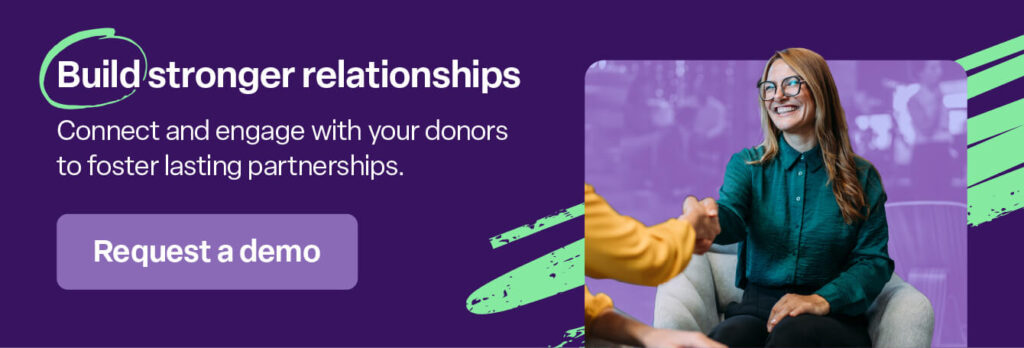
3. AlumniFinder
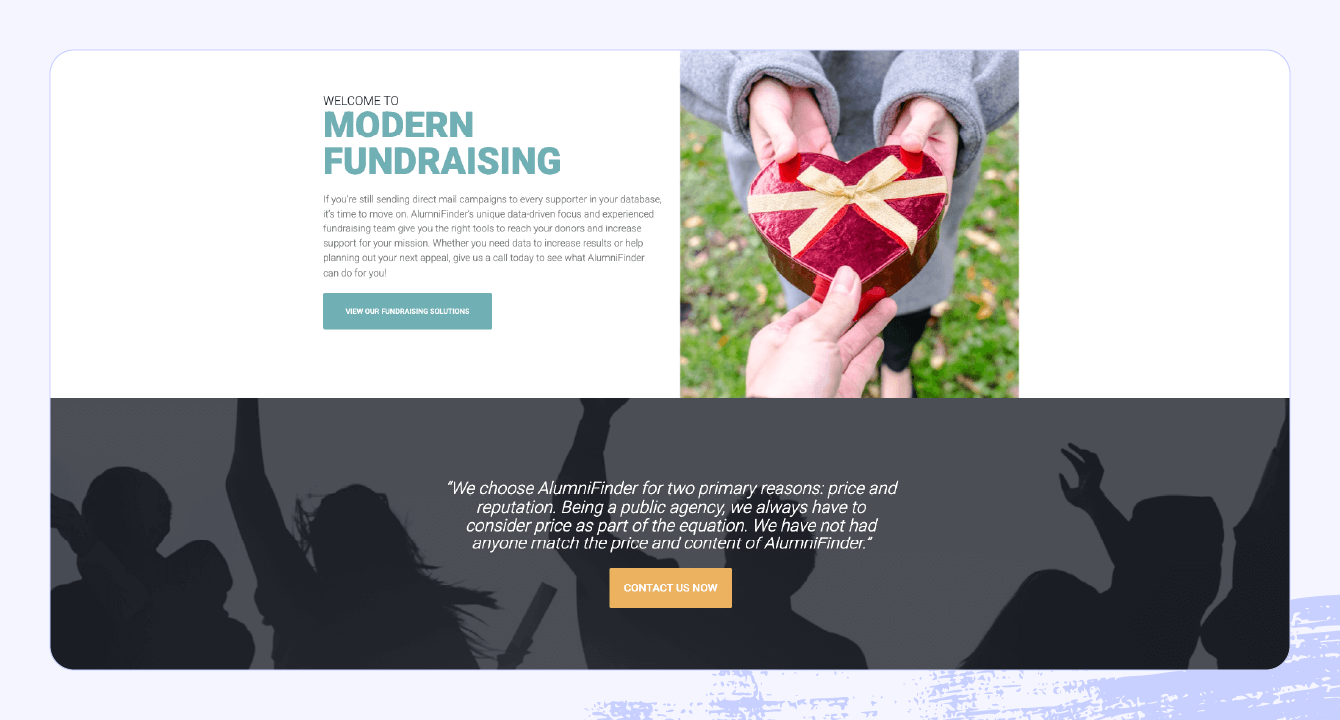
Best for: Educational institutions
AlumniFinder is a platform designed to assist organizations, particularly educational institutions and nonprofits, in locating and engaging with their alumni. It focuses on providing contact information and basic professional details to facilitate outreach and fundraising efforts. The tool primarily serves organizations looking for a straightforward solution to rebuild or maintain alumni connections.
Key features
- Contact information retrieval: Assists in locating alumni contact details, including email addresses and phone numbers
- Professional data aggregation: Gathers professional information such as job titles and company affiliations
- Alumni search functionality: Allows users to search for alumni based on criteria like name, graduation year, or location
Pros and cons
| Pros | Cons |
| Provides a focused solution for contact retrieval | Limited functionality compared to comprehensive fundraising platforms |
| Offers basic professional data to support outreach | May require supplemental tools for in-depth donor analysis |
| Straightforward search capabilities | Data accuracy is dependent on third-party sources |
Pricing: Custom pricing
4. Candid

Best for: Getting noticed by funders
Candid helps nonprofits find and get noticed for funding opportunities. By providing comprehensive data on nonprofits and funders, Candid facilitates connections and informed decision-making for grantseeking. It’s designed to help organizations showcase their impact and align with relevant funding sources, ultimately increasing their chances of securing financial support.
Key features
- Foundation and nonprofit profiles: Allows access to detailed profiles of foundations and nonprofit organizations, including financial data, programs, and leadership
- Grant data and trends: Explores grantmaking trends and detailed information on past grants, aiding in identifying potential funding opportunities
- Philanthropic research and insights: Provides access to research reports, data visualizations, and educational resources on the nonprofit sector
Pros and cons
| Pros | Cons |
| Extensive data on foundations and nonprofits | Can be overwhelming for users needing basic information |
| Provides valuable insights for grant research and strategic planning | Subscription costs can be prohibitive for smaller nonprofits |
| Offers a wide range of research and educational resources | Focuses primarily on data and research, not direct fundraising tools |
Pricing: Free and paid plans starting at $219.99/mo
5. Dataro
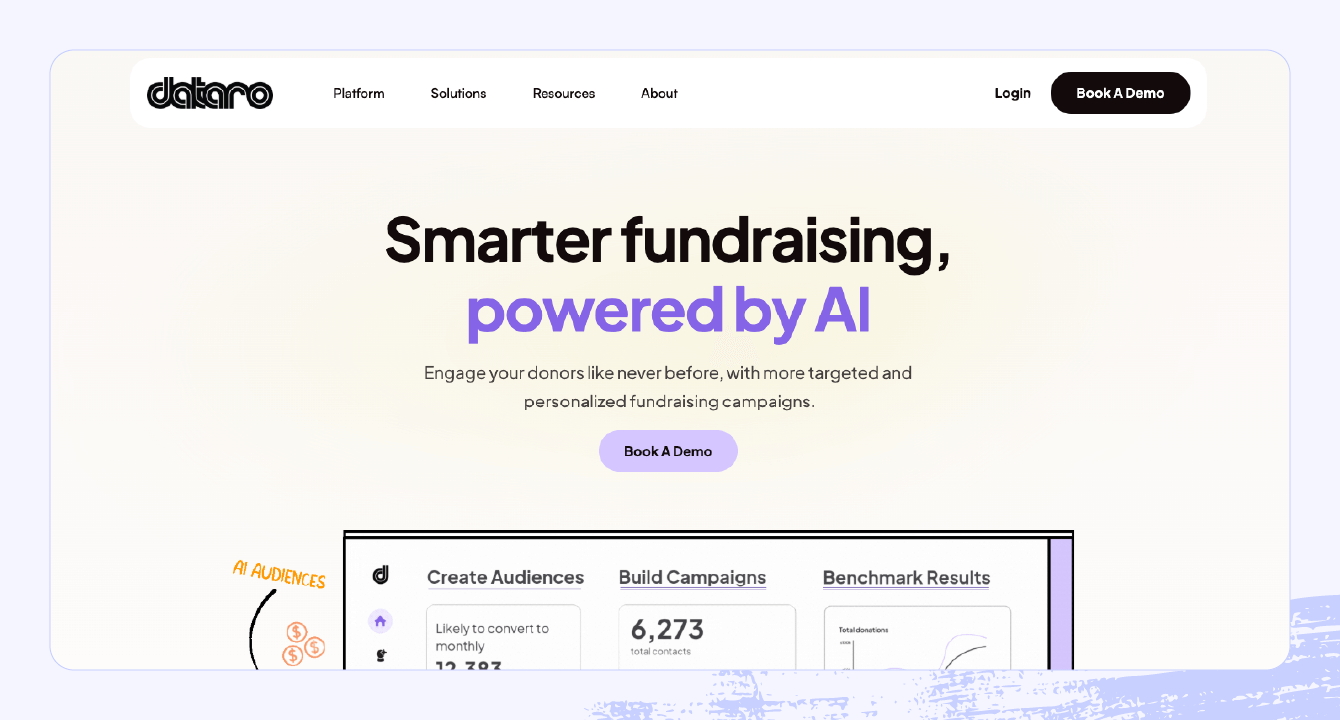
Best for: Leveraging data science
Dataro is a platform that uses artificial intelligence (AI) to predict donor behavior and optimize fundraising efforts for nonprofit organizations. It focuses on identifying high-value prospects and predicting future giving potential, aiming to enhance fundraising efficiency. Dataro is designed for nonprofits wanting to leverage data science for targeted fundraising strategies.
Key features
- AI-powered predictive modeling: Utilizes machine learning to analyze donor data and predict future giving behavior
- Prospect scoring and segmentation: Ranks prospects based on predicted giving potential, enabling targeted outreach
- Data analysis: Integrates with existing CRM systems to analyze donor data and generate actionable insights
Pros and cons
| Pros | Cons |
| Leverages AI for advanced donor prediction | Reliance on AI may require a level of trust in black-box algorithms |
| Enhances fundraising efficiency through targeted outreach | Requires integration with existing CRM, which may present technical challenges |
| Provides data-driven insights for strategic fundraising decisions | Effectiveness of predictions depends on the quality and volume of input data |
Pricing: Custom pricing
6. DonorSearch
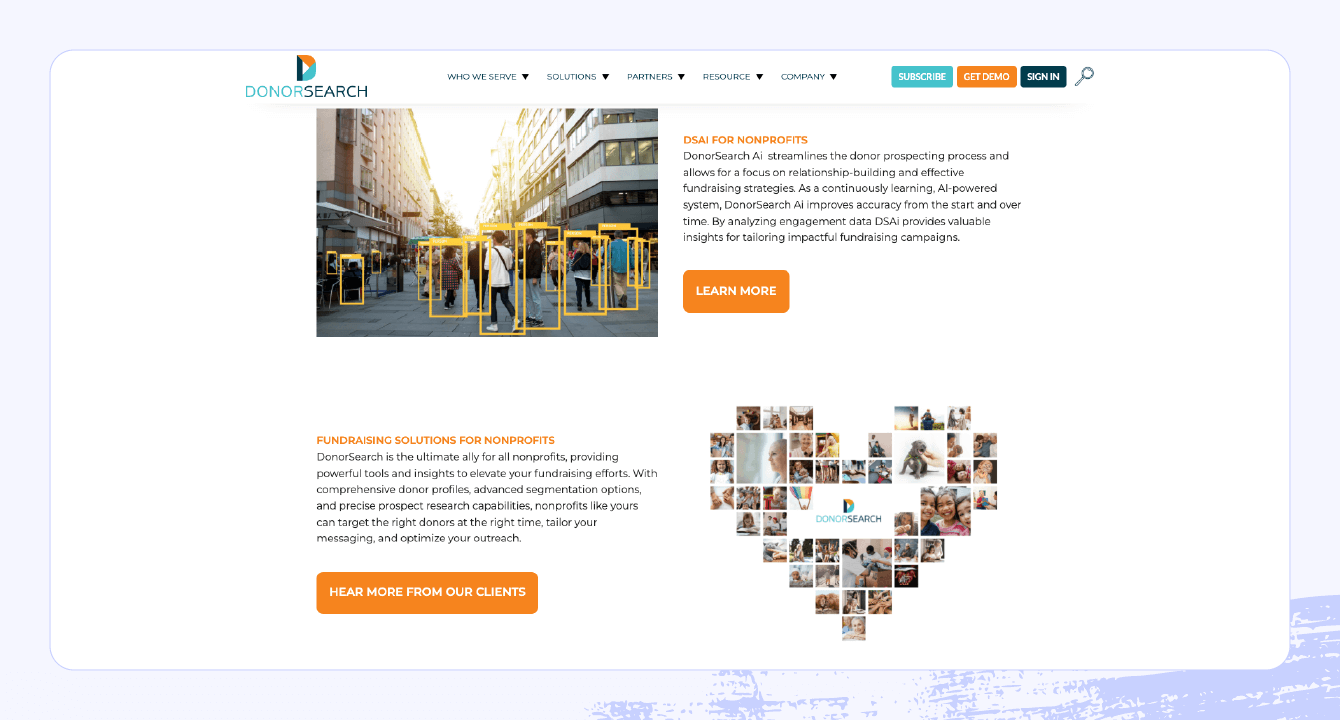
Best for: Identifying giving history
DonorSearch is a donor database that provides in-depth philanthropic and wealth data to nonprofit organizations, enabling them to identify and cultivate major donors. It focuses on the intersection of giving capacity and philanthropic inclination, making it particularly useful for organizations pursuing major gifts fundraising.
Key features
- Wealth screening: Has tools to assess potential donors’ wealth capacity, including real estate holdings, business affiliations, and stock ownership
- AI-powered prospect scoring: Utilizes artificial intelligence to help identify the most promising donor prospects
- Integration capabilities: Integrates with many common CRM platforms that nonprofit organizations use
Pros and cons
| Pros | Cons |
| Provides detailed philanthropic giving history | Cost can be a factor for smaller organizations |
| Offers strong wealth screening capabilities | Data accuracy is reliant on the quality of source information |
| AI prospect scoring aids in focusing on the highest potential donors | Requires integration with existing systems to maximize effectiveness |
Pricing: Custom pricing
7. FreeWill
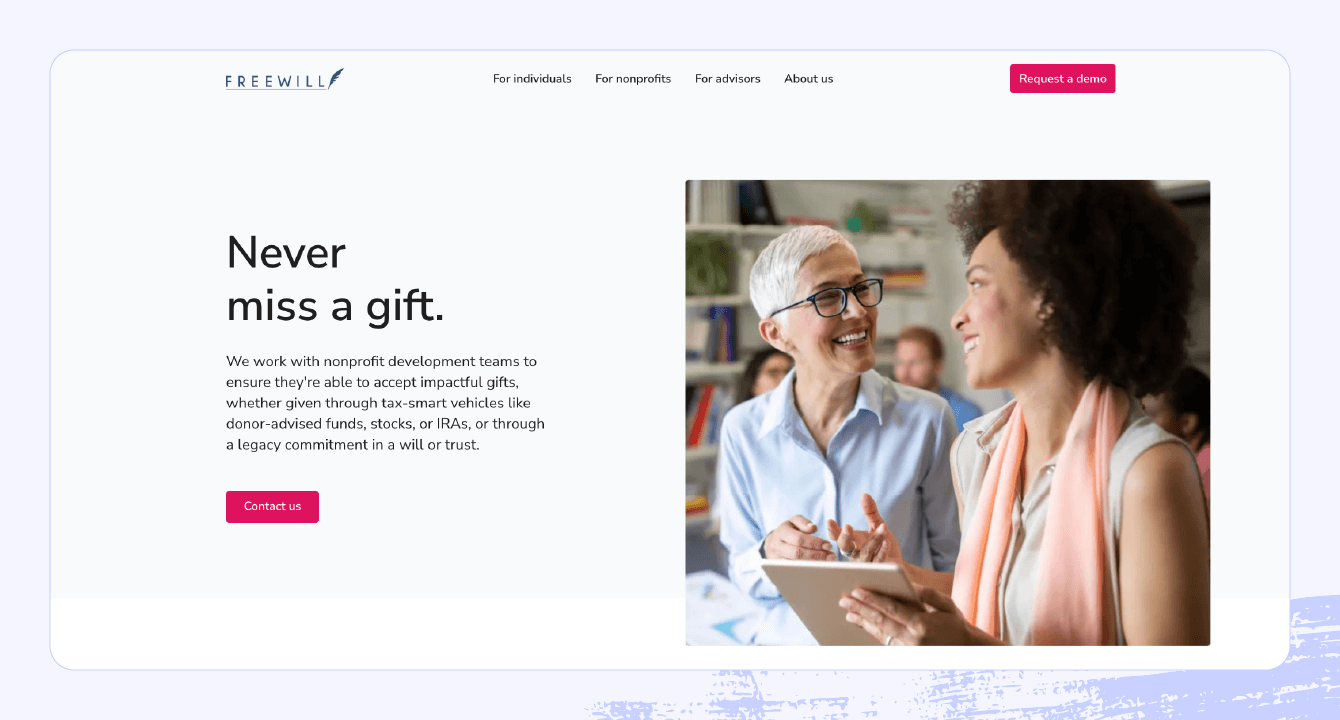
Best for: Growing planned giving initiatives
FreeWill provides online tools for individuals to create legally valid wills and planned giving documents, primarily designed to help nonprofits increase legacy giving. It simplifies the process of estate planning, making it accessible to a broader audience and encouraging users to include charitable bequests in their plans.
Key features
- Online will creation: Offers a user-friendly platform for creating legally valid wills
- Planned giving integration: Facilitates the inclusion of charitable bequests in estate plans
- Educational resources: Provides information and guidance on estate planning and planned giving
Pros and cons
| Pros | Cons |
| Simplifies estate planning for potential donors | May not be suitable for complex estate planning needs |
| Encourages planned giving and legacy gifts | Relies on users to complete the will-making process |
| Provides a low-cost or free tool for donors | Success depends on effective promotion and integration by the nonprofit |
Pricing: Free
8. Fundraising Report Card
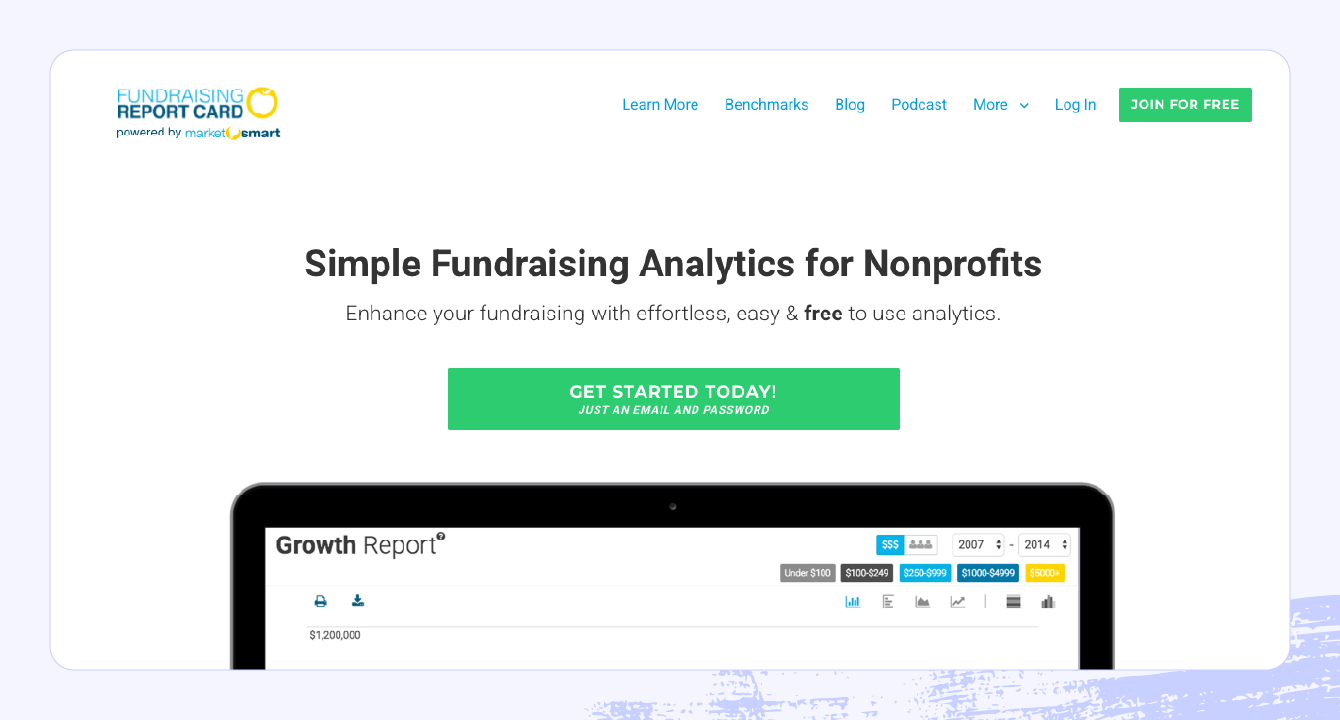
Best for: Evaluating fundraising efforts
Fundraising Report Card is a tool designed to provide nonprofits with a quick analysis of their fundraising data, offering insights into key performance indicators (KPIs) and areas for improvement. It focuses on delivering a snapshot of fundraising effectiveness, making it particularly useful for organizations seeking to benchmark their performance and identify trends. Fundraising Report Card is a nonprofit CRM that’s best for a high-level evaluation of fundraising efforts without requiring extensive data analysis expertise.
Key features
- Automated data analysis: Automatically analyzes fundraising data to generate performance reports
- KPI tracking: Monitors essential fundraising KPIs, such as donor retention and average gift size
- Benchmarking capabilities: Allows organizations to compare their performance against industry benchmarks
Pros and cons
| Pros | Cons |
| Provides quick and easy fundraising performance insights | Offers limited in-depth analysis compared to comprehensive CRM systems |
| Offers a free initial analysis to assess value | Relies on the quality of the uploaded data |
| Helps identify areas for improvement | May not provide actionable steps for every issue identified |
Pricing: Free limited option
9. GivingDNA
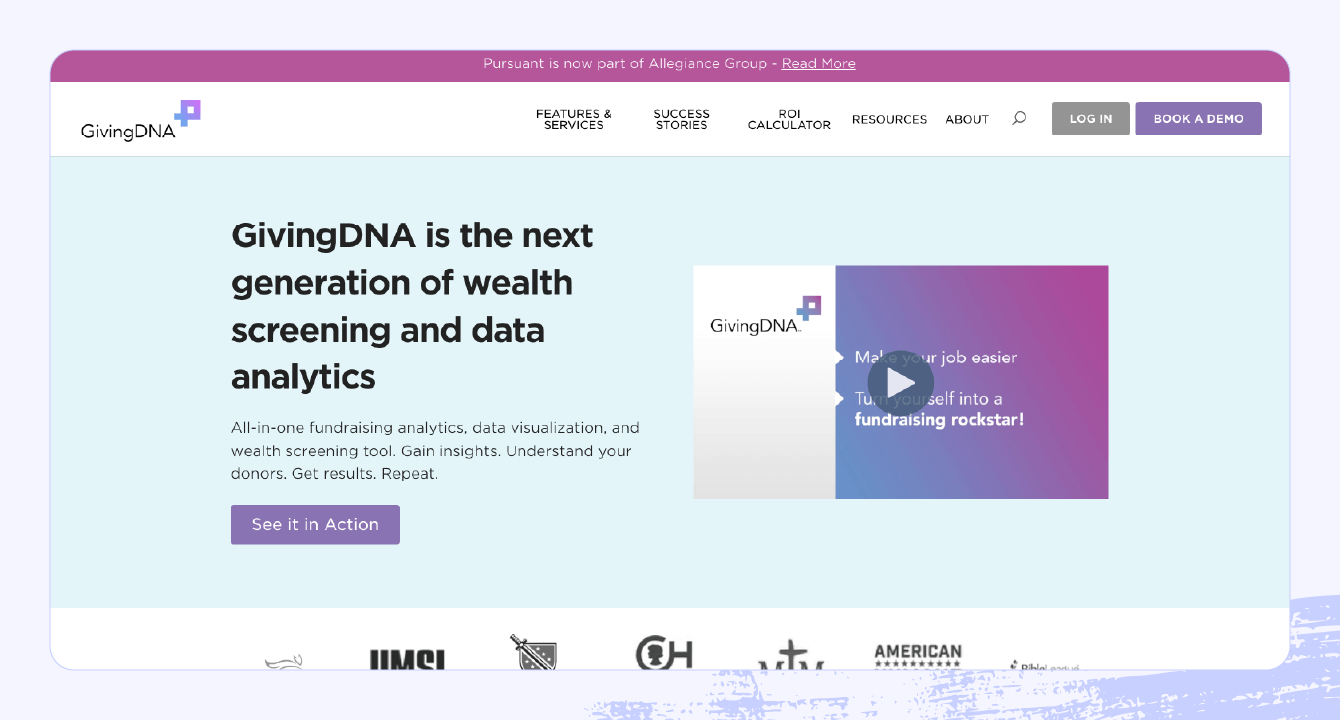
Best for: Determining donor motivations
GivingDNA is a platform that focuses on providing donor insights through behavioral analysis, aiming to help nonprofits understand why donors give and how to cultivate deeper relationships. It utilizes psychological and behavioral data to segment donors and tailor communication strategies. GivingDNA is designed for nonprofits looking to move beyond basic demographic data and gain a deeper understanding of their donors’ motivations.
Key features
- Behavioral donor profiling: Analyzes donor behavior to create psychological profiles and identify motivations
- Personalized communication strategies: Provides recommendations for tailored communication based on donor profiles
- Donor segmentation: Segments donors based on behavioral traits and giving motivations
Pros and cons
| Pros | Cons |
| Provides deeper insights into donor motivations | Relies heavily on behavioral data, which may be complex to interpret |
| Enables highly personalized communication strategies | May require significant effort to integrate with existing CRM systems |
| Offers a unique approach to donor segmentation | Effectiveness depends on the accuracy of the behavioral analysis |
Pricing: Custom pricing
10. iWave
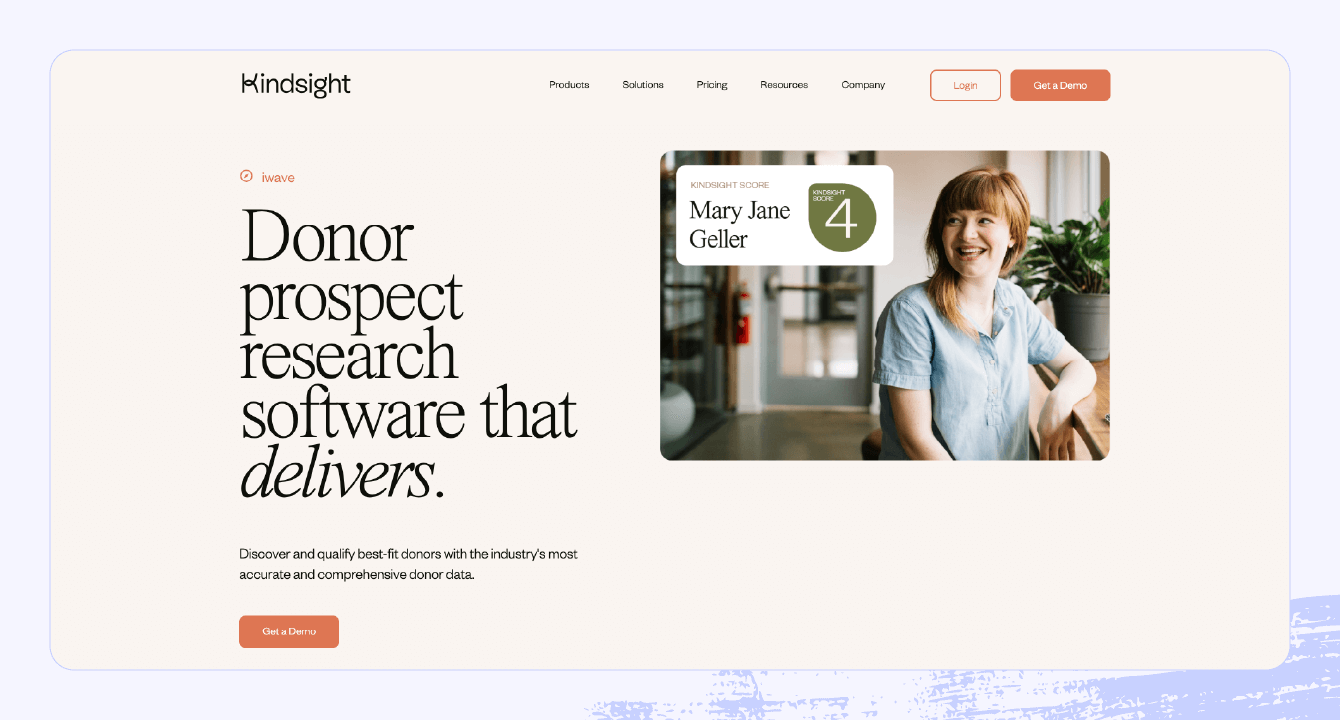
Best for: In-depth prospect research
iWave is a prospect research platform that provides comprehensive wealth screening and philanthropic data designed to help nonprofits identify major gift prospects. It aggregates data from various sources to create detailed profiles of potential donors, focusing on both wealth and giving capacity.
Key features
- Wealth screening: Assesses potential donors’ wealth using multiple data points, including real estate, business affiliations, and stock holdings
- Philanthropic screening: Provides insights into past charitable giving and nonprofit affiliations
- Proprietary scoring system: Utilizes a scoring system to rank prospects based on their giving potential
Pros and cons
| Pros | Cons |
| Provides comprehensive wealth and philanthropic data | Can be expensive for smaller organizations |
| Offers a proprietary scoring system for prospect ranking | Data accuracy is reliant on the quality of source data |
| Facilitates in-depth prospect research for major gifts | May require training to fully utilize all features |
Pricing: Starting at $3,545 one time fee
11. Instrumentl
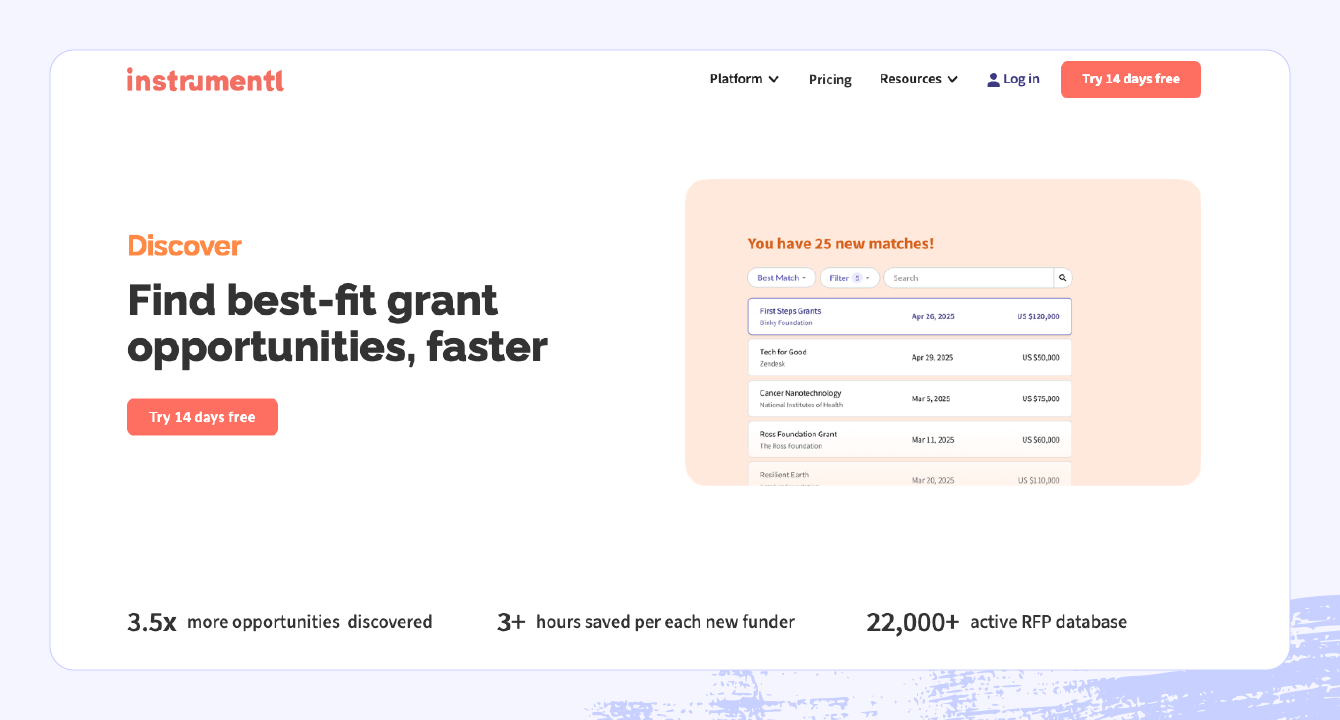
Best for: Grant fundraising efficiency
Instrumentl is a grant prospecting and tracking platform designed to help nonprofits and grant writers streamline the grant application process. It offers tools for identifying relevant grant opportunities, managing grant applications, and tracking deadlines.
Key features
- Grant database: Access to a database of active grant opportunities from various sources
- Grant matching: Matches organizations with relevant grant opportunities based on their programs and needs
- Analytics and tracking: Provides tools for managing grant applications, deadlines, and reporting requirements
Pros and cons
| Pros | Cons |
| Streamlines the grant application process | Subscription costs can be a consideration for budget-conscious nonprofits |
| Provides a comprehensive grant database | Relies on users to maintain accurate organizational profiles for effective matching |
| Offers tools for grant tracking and management | The effectiveness of grant matching depends on the completeness of grant provider data |
Pricing: Starting at $179/mo
12. Leadership Connect
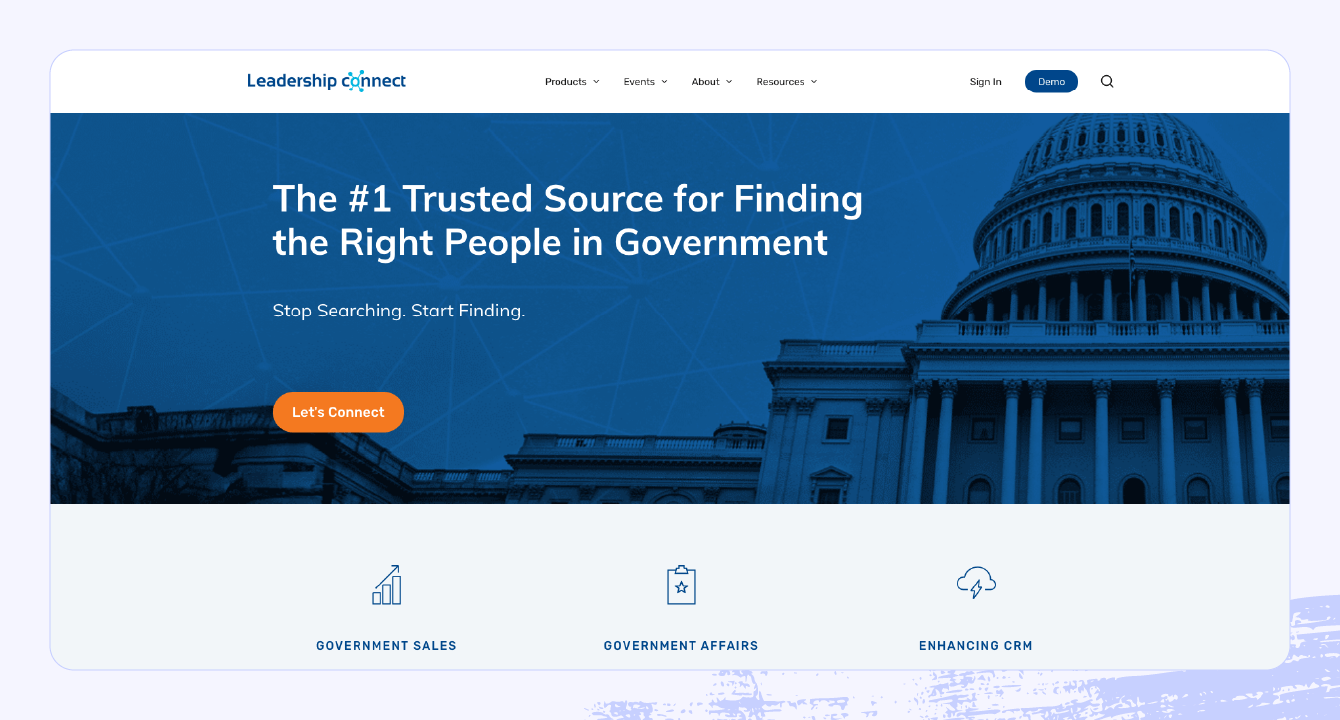
Best for: Up-to-date contact information
Leadership Connect provides detailed contact information and organizational charts for professionals in various sectors, including government, business, and nonprofits. It focuses on facilitating direct connections with key decision-makers, making it valuable for organizations seeking to build relationships and conduct targeted major donor outreach.
Key features
- Contact information database: Access to a comprehensive database of contact information for professionals
- Organizational charts: Visual representations of organizational structures to identify key decision-makers
- Search and filtering: Advanced search and filtering options to locate specific individuals and organizations
Pros and cons
| Pros | Cons |
| Provides detailed contact information for key decision-makers | Can be expensive, especially for smaller organizations |
| Offers organizational charts for identifying influential individuals | Data accuracy is reliant on frequent updates |
| Facilitates targeted outreach and relationship building | May require training to fully utilize all features |
Pricing: Custom pricing
13. LexisNexis
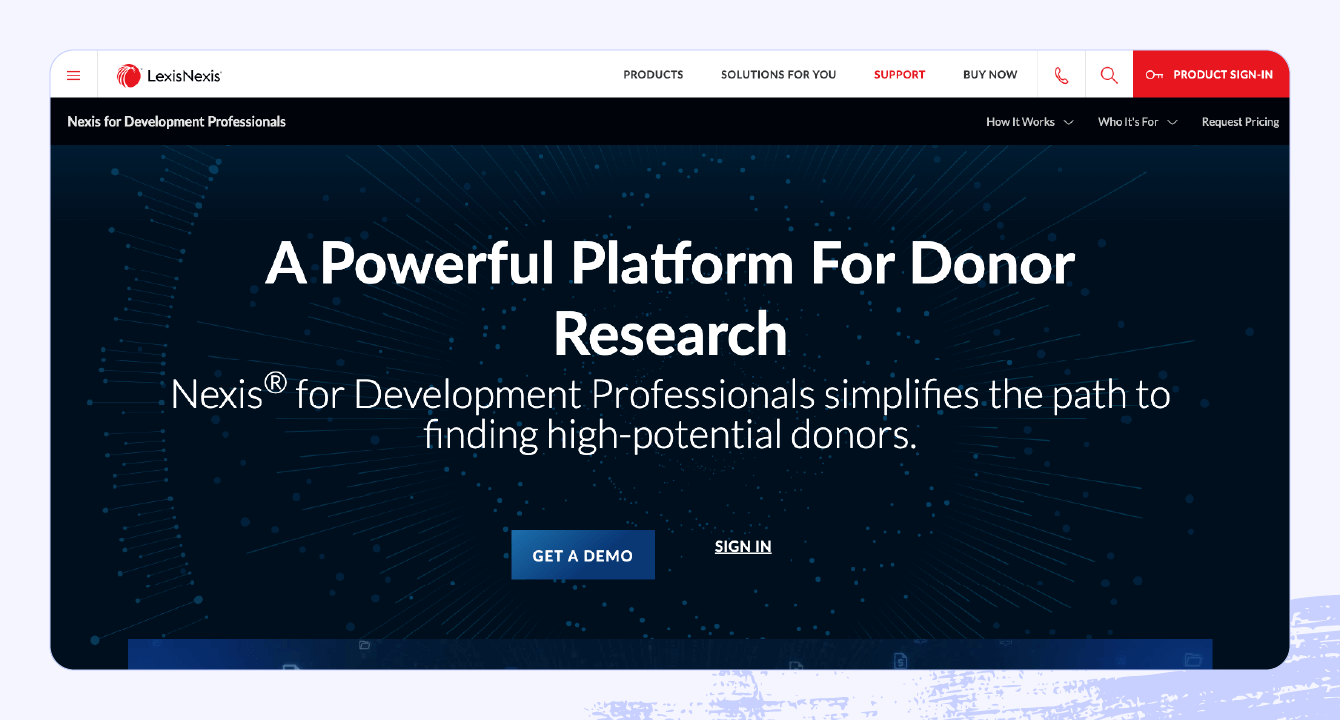
Best for: Compliance and data analysis
LexisNexis provides a wide range of legal, regulatory, and business information, including public records, news, and company data. It offers tools for research, due diligence, and risk assessment, making it valuable for organizations needing comprehensive information for decision-making. LexisNexis is best suited for organizations requiring in-depth research and data analysis for compliance and prospect research.
Key features
- Public records search: Access to extensive public records, including legal documents and property records
- News and media monitoring: Tools for monitoring news and media for relevant information
- Company and financial data: Access to detailed company and financial information
Pros and cons
| Pros | Cons |
| Provides access to a vast amount of legal, regulatory, and business information | Can be complex and require training to effectively use |
| Offers powerful search and analysis tools | Subscription costs can be significant |
| Facilitates in-depth research and due diligence | The breadth of data can be overwhelming for focused tasks |
Pricing: Starting at $114/mo
14. LinkedIn

Best for: Building supporter connections
LinkedIn is a professional networking platform that enables users to connect with colleagues, industry professionals, and potential donors. It provides insights into individuals’ professional backgrounds, affiliations, and connections, making it a valuable tool for building relationships and identifying potential major donors. You can leverage your professional network through LinkedIn to enhance major donor fundraising efforts and build connections with potential supporters.
Key features
- Professional networking: Connects you with professionals and helps you build relationships
- Profile insights: Allows access to information on individuals’ professional backgrounds and affiliations
- Group and company pages: Enables engagement with industry groups and organizations
Pros and cons
| Pros | Cons |
| Facilitates professional networking and relationship building | Information accuracy depends on user updates |
| Provides insights into individuals’ professional backgrounds | Premium features can be expensive |
| Enables targeted outreach and connection with potential donors | Time-consuming to build and maintain helpful connections |
Pricing: Free and paid plans starting at $29.99/mo
15. Million Dollar List
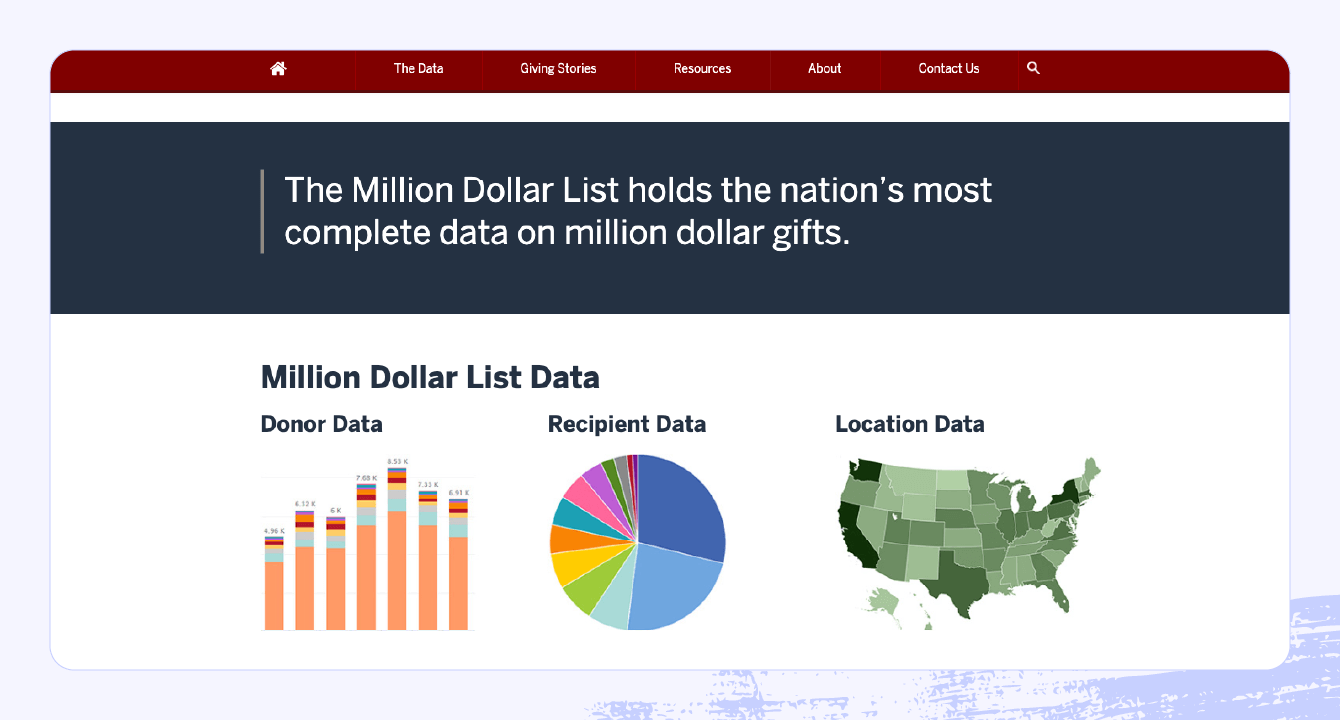
Best for: Large-scale philanthropic giving
Million Dollar List is a database that tracks publicly announced charitable gifts of $1 million or more, providing insights into major philanthropic giving trends. It helps organizations identify potential major donors and understand the giving patterns of high-net-worth individuals. Million Dollar List is best suited for nonprofits that want to enhance their major gift fundraising strategies by gaining insights into large-scale philanthropic giving.
Key features
- Major gift tracking: Tracks publicly announced gifts of $1 million or more
- Philanthropic trend analysis: Provides insights into major giving trends and patterns
- Donor identification: Helps identify individuals and foundations with a history of major giving
Pros and cons
| Pros | Cons |
| Provides insights into major philanthropic giving trends | Limited to publicly announced gifts, potentially missing private donations |
| Helps identify potential major donors with a history of large gifts | May not provide detailed prospect profiles |
| Offers data for strategic major gift fundraising | Data reflects historical giving, not necessarily future behavior |
Pricing: Free
16. National Center for Charitable Statistics
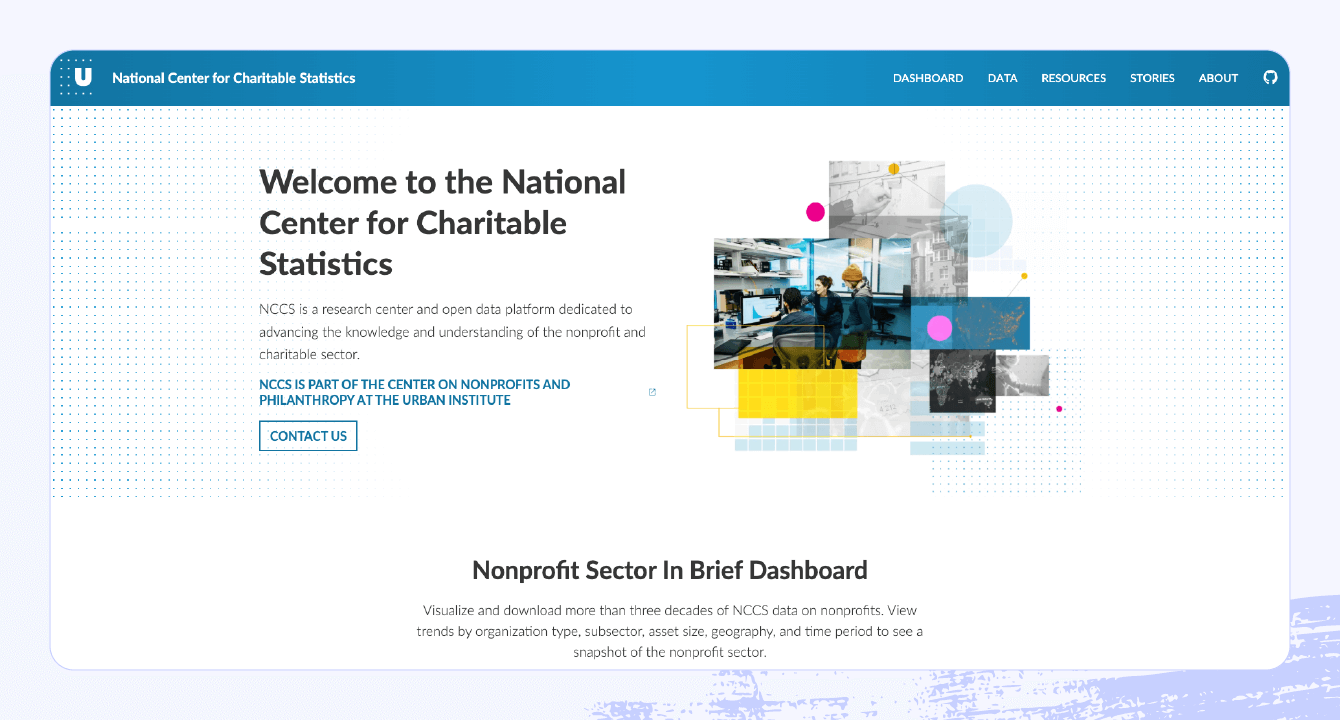
Best for: Free data on corporate finances
The National Center for Charitable Statistics (NCCS) is a free prospect research tool that provides access to data, including financial information and program data. It serves as a resource for researchers and nonprofits, making it well suited for organizations needing free data on corporate finances and activities.
Key features
- IRS Form 990 data: Access to financial information from IRS Form 990 filings
- Nonprofit data search: Allows you to search and filter data on nonprofit organizations
- Research and reports: Access to research reports and data analyses on the nonprofit sector
Pros and cons
| Pros | Cons |
| Provides free access to nonprofit financial data | Data may be limited to publicly available IRS filings |
| Offers valuable insights into nonprofit finances and activities | Data can be delayed, reflecting past filings |
| Useful for basic nonprofit research and due diligence | Requires knowledge of IRS forms for effective use |
Pricing: Free
17. Prospect Visual
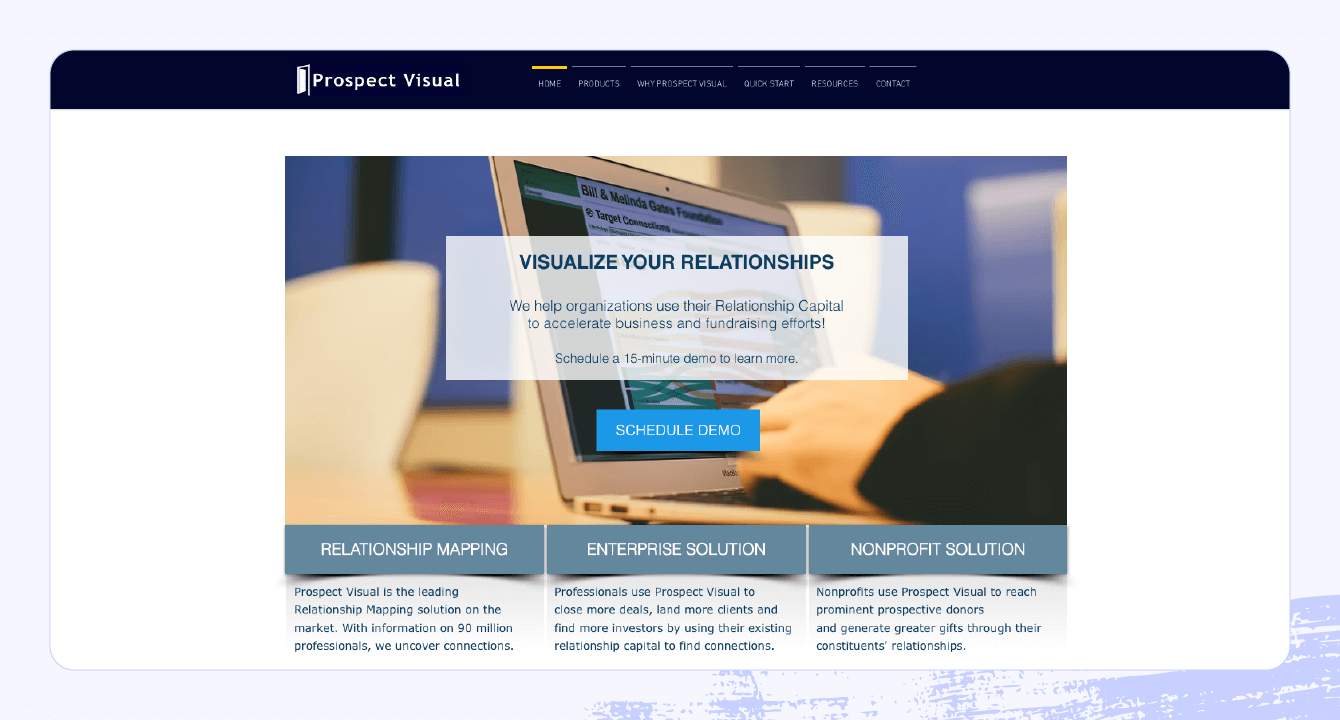
Best for: Visual data analysis
Prospect Visual is a data visualization tool designed to help nonprofits understand and analyze their donor data. It creates visual representations of donor relationships, giving patterns, and wealth indicators, enabling organizations to identify potential major donors and develop targeted fundraising strategies.
Key features
- Donor network visualization: Visual representations of donor connections and relationships
- Wealth indicator mapping: Maps wealth indicators to identify high-potential prospects
- Giving pattern analysis: Visual analysis of donor giving patterns and trends
Pros and cons
| Pros | Cons |
| Provides visual representations of donor data for easier analysis | May require training to effectively interpret complex visualizations |
| Enhances prospect research through visual analysis | Integration with existing CRM systems may present challenges |
| Facilitates the identification of potential major donors | Effectiveness depends on the quality and completeness of input data |
Pricing: Custom pricing
18. Security and Exchange Commission (SEC)

Best for: Researchers seeking donor financial data
The Securities and Exchange Commission provides access to public company filings and financial data, offering insights into the financial health and activities of publicly traded companies and their executives. It serves as a resource for researchers and organizations conducting prospect research.
Key features
- Company filings (EDGAR): Access to company filings, including 10-K, 10-Q, and proxy statements
- Stock and trading data: Provides information on stock transactions by company executives and insiders
- Financial statements: Access to detailed financial statements of publicly traded companies
Pros and cons
| Pros | Cons |
| Provides free access to public company financial data | Requires financial literacy to interpret complex filings |
| Offers valuable insights into the financial health of potential donors | Data is limited to publicly traded companies |
| Useful for prospect research on company executives and shareholders | Time-consuming to parse through large amounts of data |
Pricing: Free
How to choose prospect research software
Finding the right prospect management software can feel overwhelming. Let’s look at some tips for finding the fundraising tool that best fits your organization’s unique goals.
- Look beyond wealth screening: Prospect research goes beyond wealth screening. Software tools help you understand a prospect’s full potential, not just their financial capacity. Discover critical affinity markers alongside interests and past engagement for a more holistic view that drives successful fundraising.
- Consider collaboration features: Ensure the software allows your team to easily share information, track interactions, and coordinate outreach efforts. Collaborative tools streamline workflows and enhance communication, leading to more efficient prospect management.
- Prioritize relationship management: Choose software that provides robust tools for tracking donor interactions, segmenting audiences, and personalizing communication. Effective relationship management is essential for building long-term loyalty and maximizing donor acquisition.
- Assess automation potential: Look for features that automate repetitive tasks, such as data entry, reporting, and follow-up reminders. Automation frees up your team to focus on strategic initiatives and personalized engagement.
- Consider integrations: Ensure the software seamlessly integrates with your existing CRM, email marketing platform, and other essential tools. Integrations eliminate data silos and create a unified view of your donors, improving overall efficiency.
Simplify donor prospecting with Bonterra
Investing in the right prospect research tools can transform your fundraising strategy, enabling you to build meaningful relationships and secure vital funding. But finding a platform that truly integrates all the necessary functions can be challenging.
Bonterra Fundraising and Engagement streamlines donor prospecting by providing a centralized platform for wealth screening, philanthropic data analysis, and relationship management. Beyond basic prospect identification, it enables you to uncover hidden connections, analyze giving patterns, and predict future donor behavior.
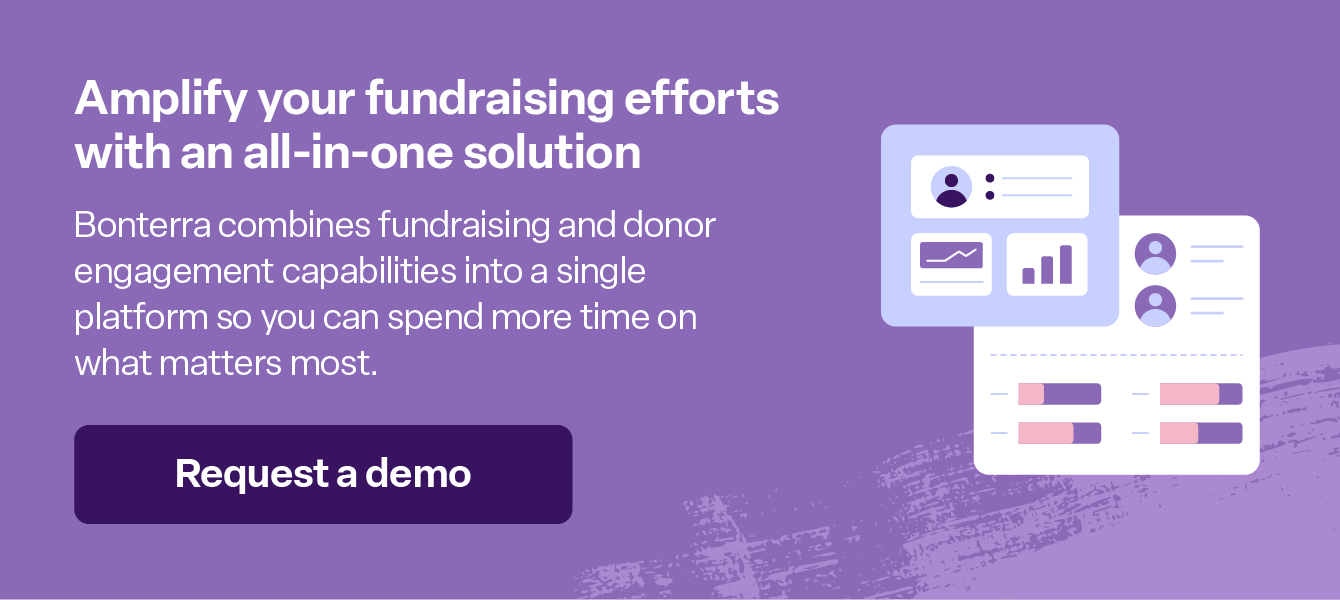
FAQ
The prospect research methodology involves systematically gathering and analyzing data about potential donors to assess their capacity, affinity, and likelihood to give. This includes identifying potential donors, screening for wealth and philanthropic history, analyzing data for insights, and prioritizing prospects for outreach.
Work with Bonterra



